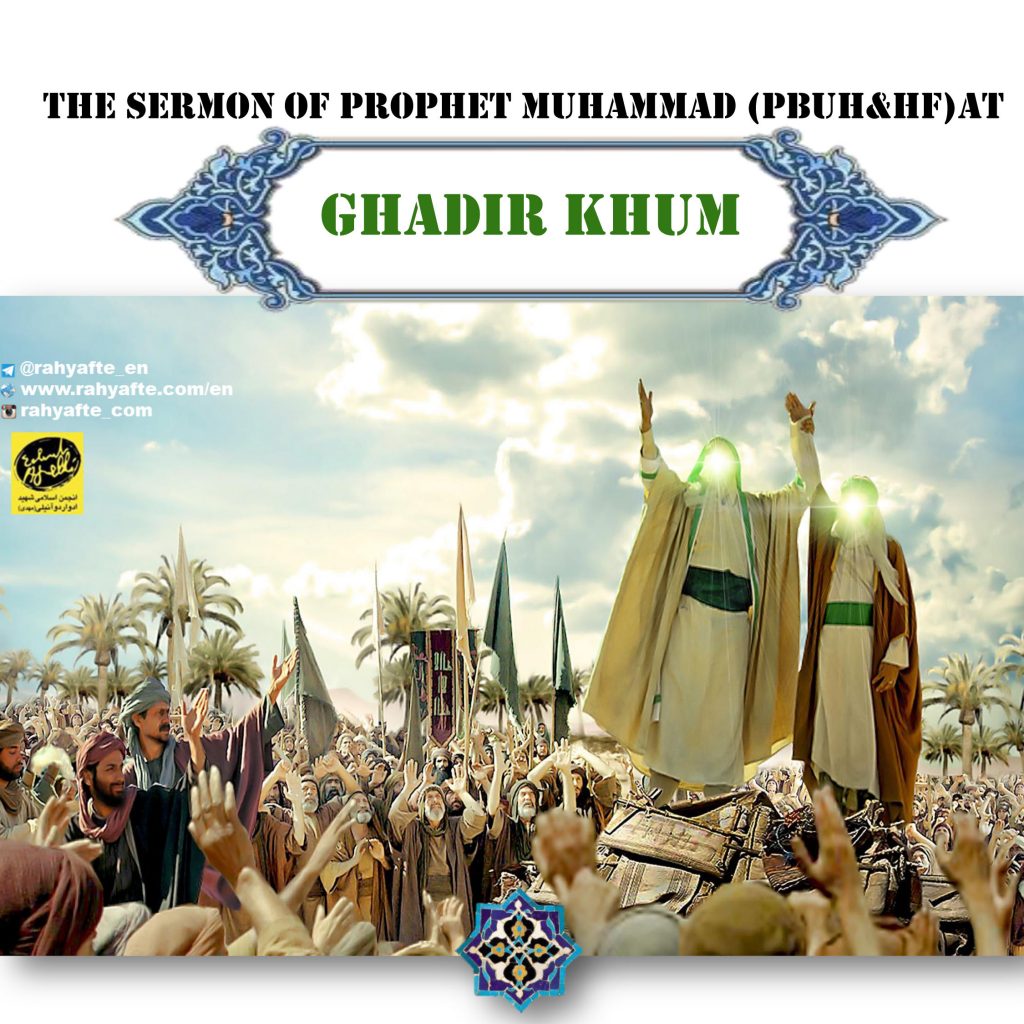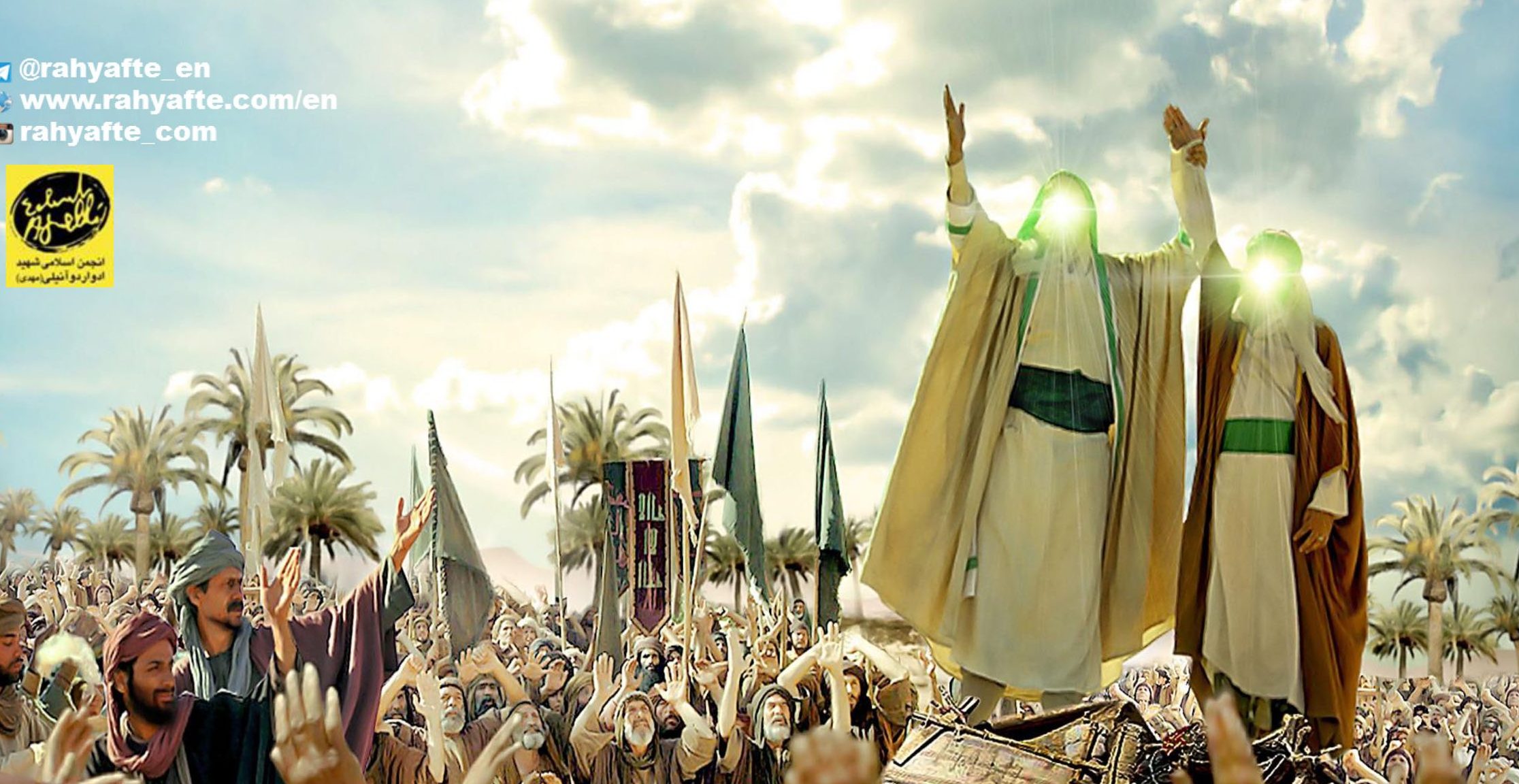According to rahyafte (the missionaries and converts website):
By: S. Hosein Hoseiny
Nowadays, some of the intellectual religious leaders believe that the ‘Leadership’ in Islam is something related to the history! Therefore, they believe that any kind of discussion, concerning the ‘Leadership’, causes hostility among the different sects and creeds in Islam. In fact, by saying so, they refer to Shiite, not any other sects among the Muslims! They deliberately, or un-deliberately, but we believe deliberately, support the other sects rather than, the main theology, Shiite. To probe their opinions, we are to point out the question of belief, the ‘Leadership’ in Islam, and then we refer to the straightforward narrations of the Holy Prophet and his offspring, (peace be upon them all), through the plain Verses of the Holy Qur’an.
I – Generally speaking, the first party of them are those who have no knowledge about the ‘Prophet-hood’ of the Messenger (peace be upon him and his descendants) that is related to the Unseen World – Divine. Thus, they see to the matter of the religion with their material eyes. And they simply take the Holy Prophet (peace be upon him and his descendants), who is the Divine message carrier, as a peacemaker and merely a talented one. And, in their opinion, the religious percepts must be suited to the terrestrial affairs. Therefore, considering the ‘Divine Leadership’ as historical, not the truth, is their wrong assumption; the true believers, who believe that the ‘Leadership’ is straight from the Divine, do not agree with their false brainwork. And that, in their opinion, such questions on the ‘Divine Leadership’, may lead to hostility; thus, we reply: ‘If you are telling the truth, and are so well-wishers to man, then why do you not make people accept the fact and set the ideology on the truest faith? There! In the name of solidarity, you ignore the numerous facts but set up a temporary brief and frail unity.

II – The sign of belief in the ‘Divine Leadership’ and its meaning must be taken into consideration. Regarding to Abraham, (peace be upon him), and his leadership, we read in the Holy Qur’an: ‘And when the Lord of Abraham tested him by means of some words of command and he fulfilled them, Allah stated, “I am going to set you as a guide for mankind,” he asked, “What about my offspring?” He stated, “My ‘Leadership’ pledge does not apply to the wrongdoers,”’ (the Cow: 2/124). Therefore, the ‘Divine Leadership’ is a compact set by Allah Alone, and it is a position requiring integrity, and no one, but Allah picks one to such dignity if He desires. On the other hand, as the well-known narration of ‘θæghælæin’ quotes, there are two definite substitutions to the Holy Prophet (peace be upon him and his descendants):
1) the ‘holy Qur’an’, and 2) ‘the Divine Leader’. They are adhered to the prophet-hood – they both are attached and are side by side supporting the Rule of Islam and the teaching of the Messenger. The Holy Prophet (peace be upon him and his descendants), said: “I am to leave two most precious *Subordinates with you: Allah’s Book and my household. Now let me see how you are going to refer to them and respect those two,” (Kafee: 1/293, and the explanation of Nahj-ul-Balagheh: 7/375). *Here the word, ‘subordinates’ means that the Holy Prophet (peace be upon him and his descendants) was commanded to present a deputy by Allah’s leave; and his mentioning the household of his, alongside with the Holy Qur’an, means that his command by chosen them, was not merely choosing the ‘Imam’ as a simple governor or commander, but someone to represent all the characteristic of Prophet as a Messenger of Allah – except that his prophet-hood and law carrying was by Allah – as he had time and again announced: “O Ali, you are for me as Aaron to Moses, except for that there will not be a messenger after me,” (Kafee: 1/199. *But after Moses there came messengers+. And Imam Kazim, (Peace be upon him), has narrated: “The Divine Leadership is but Light, (Kafee: 25). And we read in Imam Reza’s famous narrations: ‘The ‘Divine Leadership’ is the main pride pillar of Islam, and also its tall branches,” (Kafee: 1/198). The dignity and the state of ‘Divine Leadership’ is far beyond the reach of man’s wisdom to be chosen with ballot castings! That is why the Holy Prophet has chosen and introduced the ‘Leader’ and the ‘Divine Leadership’ as his own proxy after him. He well knew the dignity of Ali (peace be upon him), and during his twenty and else prophet-hood he has time and again expressed of Ali’s status of being a ‘Leader’ and owning the ‘Leadership’. And he has mentioned of his important positions in conveying the religious law, and commenting on the Qur’an and rites – governing and ruling the society, and his knowledge of the Unseen, and also the bravery and the courage of his.
III – The importance of the Leadership of Ali, (peace be upon him), is so great that many a Verses in the Holy Qur’an has been sent down about it, as:
(1) “Your Guardian is just Allah and His Messenger, and also those who believe, perform prayer, and pay the due welfare tax even when he bow down *to pray+,” (The Heavenly Food 5: 55). All the Shiite commentaries, as well as most commentators of the Sunnis have unanimously said that this lofty Verse has been revealed concerning Ali (peace be upon him). It was sent down when, bowing down to pray at the mosque, he had offered his welfare tax – it is recorded in Shiite’s comments: Majma-ul-Bayan: 3/209, Ghomi’s comment: 1/170, Ayashi comment: 2/ 56-58; and in Sunnis’ comments, Kashshaf: 1/623, Fakhr Razi: 12/25, Tabari: 6/186).
(2) O you who believe, obey Allah and His Messenger and those who hold the Divine Command, (Woman 4/59). According to the commenter, the word ‘Those’ in ‘Thos who hold the Divine Command’, refers to the infallible Leaders, Imams, (Shiite commentators: Majma-ul-Bayan: 3/62, Hhomi: 1/141, Ayyashi: 1/410 – 4/14; and Sunnis commentators: Kashshaf: 1/535, Fakhr Razi: 10/ 142, Tabari: 5/93).
(3) Today I have preferred your religion for you, and completed My favour upon you, and have granted Islam as a religion for you – a commitment to live in peace, [The Heavenly Food: 5/3]; (Majma-ul-Bayan: 3/156). Thus, we notice that the forgoing Verses, and tens of other Verses are about Ali, (peace be upon him)’s Leadership, and the assured guardianship of his.
IV– The above basis is about the Leadership of the Commander of the faithful, Ali, (peace be upon him): The deputy and the chief-deputy should have something in common. Thus, in Ali, (peace be upon him)’s case, Holy Prophet (peace be upon him and his descendants), had already trained him and brought him up in the warm and kind household of his. He had acquainted him with his moral attitude. In this respect, Ali, (peace be upon him), in the Sermon of the ‘Ghaseah’ says: “You are aware that I am very closely related with the Holy Prophet, Muhammad, (peace be upon him and his descendants). When I was a lad, he took me up in his lap, he pressed me to his breast and he always kept me with him. He gave me food out of his mouth to eat. He never found me telling lies and doing anything unfair. Allah appointed the angel Gabriel to show the Holy Prophet (peace be upon him and his descendants) good morals and manners right from the very beginning of his childhood. I followed in the footsteps of the Prophet very closely. Daily he gave me instruction and told me to follow it. The Holy Prophet (peace be upon him and his descendants) lived in the mount of Hira every year for one month and none but me saw him there. I saw the Light of revelation on his face, When Gabriel brought the first revelation from Allah to Muhammad (peace be upon him and his descendants), the Satan cried. I asked the Prophet what that cry was for. He said, “This is the cry of Satan. Now he is despondent and disappointed. You are indeed hearing what I hear. You are seeing what I see. But you are not a prophet; you are the minister of the Prophet. Surely you will stick to Islam.”
During the revelation of the Verse of (Poets: 26/214, ‘And warn your close relatives’), the Holy Prophet announced thrice: ‘Ali, you are the close tribe and relative to me. Surely Allah did not set up a messenger unless among his household was a brother, appointed heir and a deputy to him. So which one of you swear allegiance with me as a brother, heir and administrator; and in the mean time, being to me as Aaron to Moses, though there comes no messenger after me.’ But his relatives kept silence, and soon after, the Holy Prophet (peace be upon him and his descendants) said: “Now, let one of you stand up or somebody else will rise and then you will regret it.” Right then Ali, (peace be upon him) stood up on his feet. The Holy Prophet asked him to walk closer to him, so did he. The Holy Prophet (peace be upon him and his descendants) received him kindly and announced: ‘Here! I quench him with the wisdom and knowledge’, (Behar: 18/ 163). This event, along with hundreds alike, are the affairs going on between the Holy Prophet (peace be upon him and his descendants) and the Commander of the faithful, Ali, (peace be upon him), concerning the Divine Leadership. V– The famous and the most authentic proof about the ‘Divine Leadership’ of Ali, (peace be upon him) is the event of Ghadir Khom, when the Holy Prophet (peace be upon him and his descendants), after the rites of pilgrimage, in the historical farewell pilgrimage hold Ali, (peace be upon him) on hand and introduced him to the people around saying: “O Prophet announce what has been sent down to you by your Lord. If you do not do so, you have not conveyed His message. Allah defends you from people; surely Allah does not guide the unbelieving people, (The Heavenly Food: 5/ 67). The successive narrations and the relevant texts of the Sermon about ‘Ghadir’ prove the importance and the credit of it, as:
(1) The announcement of the farewell pilgrimage and the last year of the Holy Prophet (peace be upon him and his descendants)’s life. (2) Inviting the Muslims of Medina and all other Islamic regions for the rites of the pilgrimage. (3) The set out of ‘one hundred and twenty thousand people’ from Medina to the pilgrimage ceremony. (4) Summoning Ali, (peace be upon him) and his companions from Yemen to take part in the farewell ceremony. (5) Delivering a speech, by the Holy Prophet (peace be upon him and his descendants) in Medina, and in the Mosque of Khif for preparing the people for the Ghadir Khom event. (6) Staying by the roadside and asking the people to settle and calling back the advanced crowd. (7) The three-day stop for the announcement of the ‘Leadership by the Commander of the faithful, Ali, (peace be upon him) – from the first Day of Ghadir, Monday 18th of Dilhajjeh until Wednesday the 20th). (8) The detailed sermon of the Holy Prophet (peace be upon him and his descendants) and his insisting on the ‘Devine Leadership’, and the guardianship, as well the duty of the guardian by Ali and his offspring (peace be upon all) until the Day when the Awaited Upriser, Mahdi, (may Allah hasten his emerge) – rise up. (9) The demand of the Holy Prophet (peace be upon him and his descendants) having the crowd swear allegiance – both orally, and then by hand-shakings, and getting the covenant of those present. (10) Having the males swear allegiance by shaking hands, and the females socking their hands in the full-with-water tub, (so that to avoid touching males’ hands). (11) Having the crowd swear allegiance for the Holy Prophet (peace be upon him and his descendants) to obey his descendants, as well as the Faithful. (12) Having the people to congratulate the Holy Prophet (peace be upon him and his descendants) and his Faithful Commander, Ali, (peace be upon him) about his Leadership and being an assured government. (13) A durable and everlasting bid to the future generation of the world that the message of the selection of ‘Divine Leadership’ must be carried by those present to the people absent at that moment; and also the elderly to their children. (14) Announcing that the ‘Publicizing the Event of Ghadir’ is the chief ‘Enjoining to Goodness’ and it is highly recommended. (15) Introducing Ali, (peace be upon him) on the pulpits to those unknown, and highly admiring him during the lectures and sermons. (16) Counting his about 200 virtues and pointing to his vast personality. (17) Recommending the ‘Allegiance’ and offering peace upon him as the ‘Commander of the faithful’. (18) Insisting on this title, the ‘Commander of the faithful’ and allocating it to Ali, (peace be upon him) only. (19) Considering the Holy Qur’an, and Ali, (peace be upon him), and also the rest of the ‘Imams’ at the same inseparable level. (20) Grounding the affection and the anger of Ali, (peace be upon him) in case of the people’s faith and disbelief. The above points, as well as some other tens, point put the importance of Ghadir, and introduce Ali, (peace be upon him) as the ‘Imam’ and the right proxy of the Messenger of Allah. VI– Since the beginning of the Ghadir, the Muslims and even the non-Muslims have considered the historical event of Ghadir, and the ‘Divine Leadership, and the proxy pick as, ‘the chief religious event’. They have commented on it in different books – it has been put in historical books. As the narration, they have brought it in the story books; and in dictionaries, by means of it, they have explained the words and phrases and the words meanings in it. It has come to use in the commentaries concerning the revelation of the Verses, and at last, from the point of Ghadir, it has been transcribed in the books of literatures.
Now, as you notice, by the historians are: Blazary: in Ansab Alashraf, (demised 279) Ibn Ghatibeh: in Almaarif, and Imamat and Alseiaseh, (demised 276) Tabari: in a separate book about Ghadir Khom, (demised 310) Khatib Baghdadi: in his own history, (demised 463) From the Narrations: Mohammad Ibn Idris Shafeae: quoted from Nehayeh Ibn Athir, (demised 204) Ahmad Hanbal: in Masnad and Managhib, (demised 241) Ibn Majeh: in Sunan, (demised 273) Termizi: in Sahih, (demised 276) From the Commentators: Tabari: in his Commentary, (demised 310) Tha’labi: in his Commentary, (demised 427-37) Wahedi: in Asbab An-Nozol, (demised 468) Fakhr Razi: in his commentary, (demised 606) The Orators: Ghazi Abobar Baghlani Basari: in Al-Mottahed, (demised 403) Ghazi Abdor Rahman Ijea Shafeae: in Mawagheb, (demised 756) Sharif Jorjani: in Sharh Al-Mawagheb, (demised 816) Ghoushchi: in Sharh Tajrid, (demised 879) And from the Philologists: Khom, Ghadir, Wali and … Ibn Darid: in Jomhareh, volume 1/71, (321) Ibn Athir: in An Nahayeh, (1) Al Ghadir volume 1/ 6-8 As you see, these documents prove that the question of ‘Divine Leadership’ is not merely a historical event.




















